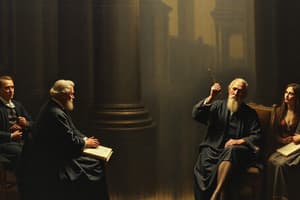Podcast
Questions and Answers
What is the main focus of political theory?
What is the main focus of political theory?
Normative aspects of political institutions and processes
Name two areas encompassed by political theory.
Name two areas encompassed by political theory.
Political philosophy, democratic theory
What does political philosophy study?
What does political philosophy study?
Fundamental questions about politics
Who are some key figures in classical political philosophy?
Who are some key figures in classical political philosophy?
What is the goal of political theory?
What is the goal of political theory?
What are some key concepts within democratic theory?
What are some key concepts within democratic theory?
Explain the difference between direct democracy and representative democracy.
Explain the difference between direct democracy and representative democracy.
Which key thinkers emerged during the 17th century in modern political philosophy?
Which key thinkers emerged during the 17th century in modern political philosophy?
What does legal theory explore?
What does legal theory explore?
What topics are covered in international theory?
What topics are covered in international theory?
Flashcards are hidden until you start studying
Study Notes
Political Science: Political Theory
Overview of Political Theory
Political theory is the branch of political science that deals with the normative aspects of political institutions and processes. It involves the study of political values, principles, and concepts, which are used to analyze and evaluate political phenomena. Political theory encompasses various areas, such as political philosophy, democratic theory, international theory, and legal theory. It aims to provide a theoretical framework for understanding and critiquing existing political systems and to propose alternative models of governance.
Political Philosophy
Political philosophy is the study of fundamental questions about politics, including what constitutes a just society, the role of the state in regulating human behavior, and the nature of political obligation. It includes classical works on topics like justice, power, and liberty, such as Plato's Republic, Aristotle's Politics, John Locke's Two Treatises of Government, and Thomas Hobbes' Leviathan.
Classical Political Philosophy
Classical political philosophy is the branch that deals with ancient Greek and Roman texts and their impact on modern political thought. Key figures from this period include Plato, Aristotle, and Polybius. They focused on questions about the best form of government, the role of citizens, and the balance between liberty and authority.
Modern Political Philosophy
Modern political philosophy emerged in the 17th century and was influenced by the Enlightenment movement. Key thinkers during this time included Thomas Hobbes, John Locke, Jean-Jacques Rousseau, and Immanuel Kant. They addressed issues related to individual rights, social contract theory, and the relationship between the state and its citizens.
Democratic Theory
Democratic theory focuses on understanding and evaluating democratic institutions and practices. This subfield explores the foundations of democracy, its different forms and variations, and how it can be strengthened or improved. Key concepts within democratic theory include popular sovereignty, representation, participation, accountability, and rule of law.
Direct Democracy vs. Representative Democracy
Direct democracy refers to a system where citizens directly participate in decision-making processes, while representative democracy involves electing representatives to make decisions on behalf of the people. Both systems have advantages and disadvantages, and debates continue regarding which model is more effective and justifiable.
International Theory
International theory examines international relations and global governance. It covers topics like diplomacy, warfare, international organizations, humanitarian intervention, and globalization. Key questions within international theory include what explains patterns of cooperation and conflict among states, the role of power dynamics in world politics, and how to promote peace and stability.
Legal Theory
Legal theory explores the normative foundations of law and legal institutions. It asks questions about the functions of law, the limits of legal reasoning, and the role of judges in interpreting laws. Some central themes within legal theory include the sources of law, legal interpretation, and the relationship between law and morality.
In conclusion, political theory plays a vital role in understanding and critiquing the normative aspects of political institutions and processes. By engaging with key concepts and theories in this field, we gain insights into the values, principles, and ideas that shape our political reality.
Studying That Suits You
Use AI to generate personalized quizzes and flashcards to suit your learning preferences.




